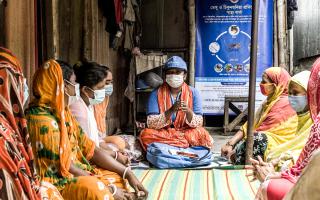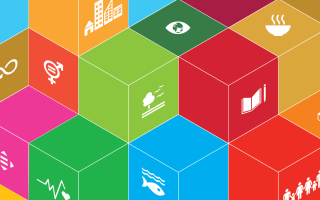Social Protection for a Rapidly Changing World
This self-paced course is designed for anyone interested in learning the basics of social protection and how to apply it through the lens of sustainable development. The course champions a universal, life-cycle approach focusing on partnerships, designing, financing, and implementing comprehensive social protection systems that reduce the vulnerabilities faced by all.
The 2030 Agenda for Sustainable Development and its 17 Sustainable Development Goals (SDGs) lay out a set of key development objectives for developed and developing countries alike to end poverty, protect the planet, and ensure prosperity for all.
Among the priorities agreed upon by Member States is social protection — cited in the agenda as a primary means to protect all individuals and families against social contingencies and market risks across the life-cycle. Countries are called on to “implement nationally appropriate social protection systems and measures for all, including floors, and by 2030 achieve substantial coverage of the poor and the vulnerable.”
Currently, an estimated 69.4 per cent of the world’s population lives without adequate social protection coverage, including lack of access to a pension, unemployment benefits, health insurance, and income guarantees.
According to the International Labour Organization, the COVID-19 pandemic has simultaneously, “exposed deep-seated inequalities and significant gaps in social protection coverage, comprehensiveness and adequacy across all countries” and, “provoked an unparalleled social protection policy response”. It is, therefore the time to accelerate the transformation of social protection systems in light of the pandemic to ensure a human-centred recovery and resilience.
The ambitious objectives of the 2030 Agenda and the newfound drive for building comprehensive social protection systems will require concerted efforts from across the spectrum of UN and national actors, joining up disparate interventions and leveraging new tools to build enhanced social protection programmes and achieve the 2030 target.
By the end of this course, participants will be able to:
- Demonstrate the need for universal social protection systems for individuals and societies to advance sustainable development
- Grasp the important national-level implications of social protection being a human right
- Recognize the value of and create a culture around social protection as an investment and lever to achieve sustainable development
- Utilize concrete policy steps to design, finance, implement, and deliver nationally appropriate social protection systems
- Identify global trends, tools, and good practices in social protection, particularly in the context of building up individual, household, and national socio-economic and crisis resilience
- Actively advocate for establishing universal, comprehensive, rights-based, and sustainable social protection systems in their country or regional context
UNSSC online courses are designed to deliver maximum learning outcomes through optimal time investments into carefully chosen high-quality learning materials. Specifically tailored to the needs of the professionals interested in developing the skills to advance their career or deepening their knowledge of a particular subject through our self-paced study modules, which include applied learning components such as case studies.
UNSSC online courses give learners the opportunity to complete activities when it best fits their schedule. UNSSC online courses incorporate the same high academic rigour as any UNSSC face-to-face programme, while participants are free to determine their own study plan.
Module 1: What is social protection?
- Definitions of social protection
- History of the welfare system and early social protection
- Where we stand today – overview of the social protection landscape
Module 2: Present and Future: Social Protection, Partnerships, and the 2030 Agenda (the “why” and “who”)
- The 2030 Agenda for Sustainable Development
- Social protection and the SDGs
- Social protection and the 5Ps
- Key partnerships in the social protection field
- Lifecycle risks
Module 3: Key pillars of social protection (the “what”)
- Social protection floors, universal social protection, and ILO standards
- Instruments of social protection (e.g., social assistance, social insurance, labour market policies)
- Complements to social protection systems (graduation, Cash+, informal social protection, care policies, universal basic income)
- Coverage, adequacy, comprehensiveness, and sustainability
- Social protection as a human right, international labour standards and social protection regulations
Module 4: Designing, financing, and reforming social protection systems (the “how”)
- The policy and reform cycle of social protection systems
- Designing social protection systems
- Adopting and updating national strategies for social protection
- Fiscal space and financing social protection
- Reforming social protection systems
Module 5: Implementing comprehensive social protection systems (the “how”)
- Implementing social protection systems
- The role of information systems and data
- Monitoring and evaluating social protection systems
- Initiating a culture of universal social protection
Module 6: Looking ahead: global trends and adaptive social protection (the “future”)
- Adaptive and shock-responsive social protection
- Deep dive: social protection during the COVID-19 pandemic
- Global trends in the social protection field
- Advocacy for social protection
This course is offered exclusively to UN staff members who would like to learn about social protection and demonstrate that they will use the knowledge gained to benefit others.
The cost is $550. Staff from UN entities can access this course upon payment of the course fee.
Certificates from the United System Staff College will be awarded to participants upon completion of the course.





